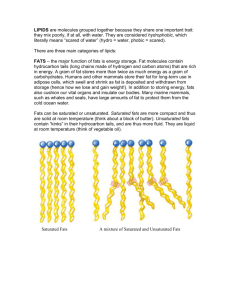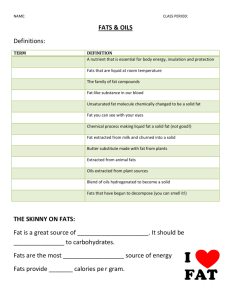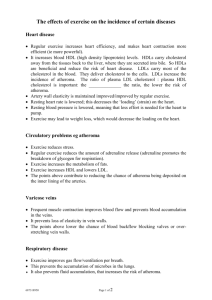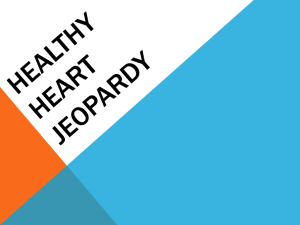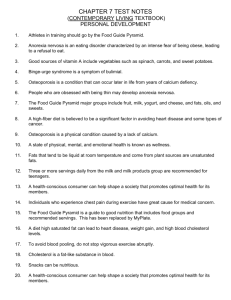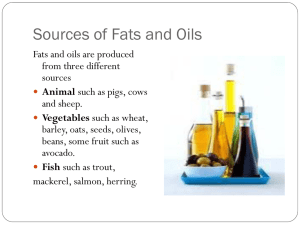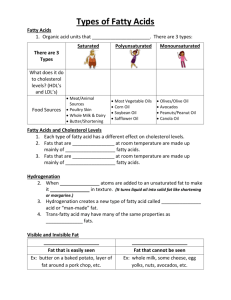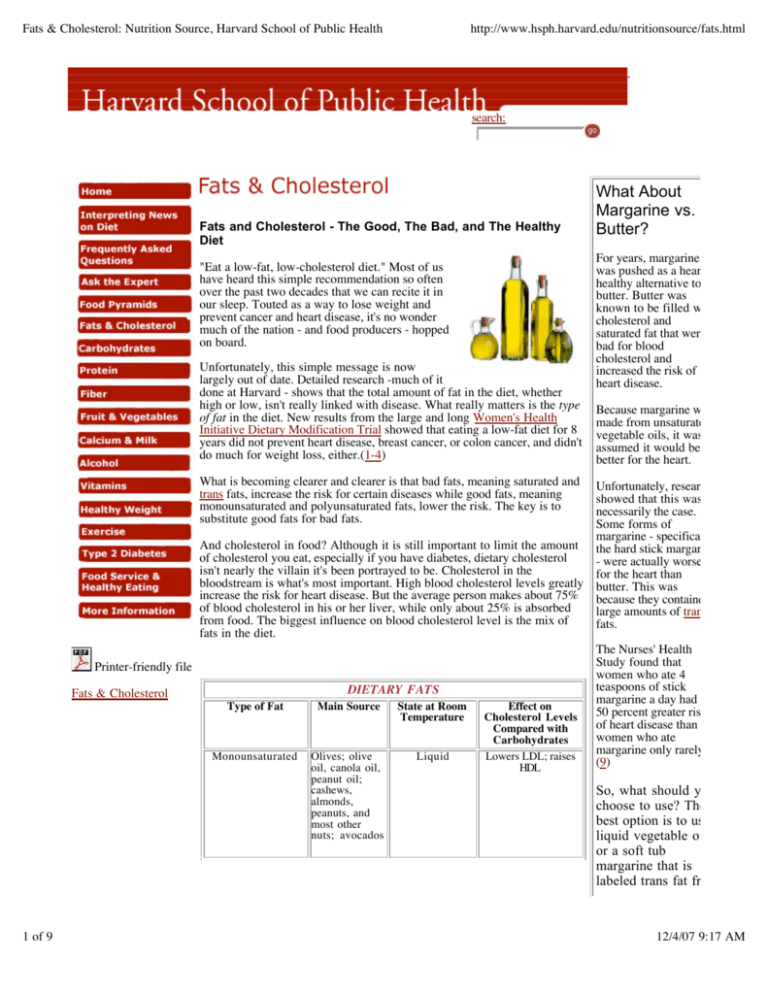
Fats & Cholesterol: Nutrition Source, Harvard School of Public Health
http://www.hsph.harvard.edu/nutritionsource/fats.html
.
search:
Fats and Cholesterol - The Good, The Bad, and The Healthy
Diet
"Eat a low-fat, low-cholesterol diet." Most of us
have heard this simple recommendation so often
over the past two decades that we can recite it in
our sleep. Touted as a way to lose weight and
prevent cancer and heart disease, it's no wonder
much of the nation - and food producers - hopped
on board.
Unfortunately, this simple message is now
largely out of date. Detailed research -much of it
done at Harvard - shows that the total amount of fat in the diet, whether
high or low, isn't really linked with disease. What really matters is the type
of fat in the diet. New results from the large and long Women's Health
Initiative Dietary Modification Trial showed that eating a low-fat diet for 8
years did not prevent heart disease, breast cancer, or colon cancer, and didn't
do much for weight loss, either.(1-4)
What About
Margarine vs.
Butter?
For years, margarine
was pushed as a heart
healthy alternative to
butter. Butter was
known to be filled with
cholesterol and
saturated fat that were
bad for blood
cholesterol and
increased the risk of
heart disease.
Because margarine was
made from unsaturated
vegetable oils, it was
assumed it would be
better for the heart.
What is becoming clearer and clearer is that bad fats, meaning saturated and
trans fats, increase the risk for certain diseases while good fats, meaning
monounsaturated and polyunsaturated fats, lower the risk. The key is to
substitute good fats for bad fats.
Unfortunately, research
showed that this wasn't
necessarily the case.
Some forms of
margarine - specifically
And cholesterol in food? Although it is still important to limit the amount the hard stick margarine
of cholesterol you eat, especially if you have diabetes, dietary cholesterol
- were actually worse
isn't nearly the villain it's been portrayed to be. Cholesterol in the
for the heart than
bloodstream is what's most important. High blood cholesterol levels greatly butter. This was
increase the risk for heart disease. But the average person makes about 75% because they contained
of blood cholesterol in his or her liver, while only about 25% is absorbed
large amounts of trans
from food. The biggest influence on blood cholesterol level is the mix of
fats.
fats in the diet.
The Nurses' Health
Study found that
Printer-friendly file
women who ate 4
teaspoons of stick
DIETARY
FATS
Fats & Cholesterol
margarine a day had a
Type of Fat
Main Source
State at Room
Effect on
50 percent greater risk
Temperature
Cholesterol Levels
of heart disease than
Compared with
women who ate
Carbohydrates
margarine only rarely.
Monounsaturated Olives; olive
Liquid
Lowers LDL; raises
(9)
oil, canola oil,
HDL
peanut oil;
cashews,
almonds,
peanuts, and
most other
nuts; avocados
1 of 9
So, what should you
choose to use? The
best option is to use
liquid vegetable oils
or a soft tub
margarine that is
labeled trans fat free
12/4/07 9:17 AM
Fats & Cholesterol: Nutrition Source, Harvard School of Public Health
http://www.hsph.harvard.edu/nutritionsource/fats.html
Polyunsaturated
Corn, soybean,
safflower, and
cottonseed
oils; fish
Liquid
Lowers LDL; raises
HDL
or
non-hydrogenated.
Saturated
Whole milk,
butter, cheese,
and ice cream;
red meat;
chocolate;
coconuts,
coconut milk,
and coconut
oil
Most
margarines;
vegetable
shortening;
partially
hydrogenated
vegetable oil;
deep-fried
chips; many
fast foods;
most
commercial
baked goods
Solid
Raises both LDL and
HDL
If you choose a soft
margarine, be sure
that it's also low in
saturated fat.
Trans
Solid or
semi-solid
Raises LDL*
Achieving and
Maintaining
Optimal Blood
Cholesterol
Levels
You can lower your
blood cholesterol
level and your risk
of heart disease by
exercising regularly;
maintaining a
*Trans fat increases LDL, decreases HDL, and increases triglycerides when
compared to monounsaturated or polyunsaturated fat.
healthy body
weight; increasing
The Cholesterol--Heart Disease Connection
dietary fiber; and
minimizing the
Cholesterol is a wax-like substance. The liver makes it and links it to carrier
amount of trans fats,
proteins called lipoproteins that let it dissolve in blood and be transported
limiting the amount
to all parts of the body. Why? Cholesterol plays essential roles in the
formation of cell membranes, some hormones, and vitamin D.
of saturated, and
replacing these with
Too much cholesterol in the blood, though, can lead to problems. In the
unsaturated fat and
1960s and 70s, scientists established a link between high blood cholesterol dietary fiber.
levels and heart disease. Deposits of cholesterol can build up inside arteries.
These deposits, called plaque, can narrow an artery enough to slow or block
blood flow. This narrowing process, called atherosclerosis, commonly
occurs in arteries that nourish the heart (the coronary arteries). When one or
more sections of heart muscle fail to get enough blood, and thus the oxygen
and nutrients they need, the result may be the chest pain known as angina.
In addition, plaque can rupture, causing blood clots that may lead to heart
attack, stroke, or sudden death. Fortunately, the buildup of cholesterol can
be slowed, stopped, and even reversed.
Cholesterol-carrying lipoproteins play central roles in the development of
atherosclerotic plaque and cardiovascular disease. The two main types of
lipoproteins basically work in opposite directions.
Low-density lipoproteins (LDL) carry cholesterol from the liver to the rest
of the body. When there is too much LDL cholesterol in the blood, it can
be deposited on the walls of the coronary arteries. Because of this, LDL
cholesterol is often referred to as the "bad" cholesterol.
High-density lipoproteins (HDL) carry cholesterol from the blood back to
the liver, which processes the cholesterol for elimination from the body.
HDL makes it less likely that excess cholesterol in the blood will be
deposited in the coronary arteries, which is why HDL cholesterol is often
referred to as the "good" cholesterol.
In general, the higher your LDL and the lower your HDL, the greater your
risk for atherosclerosis and heart disease.
2 of 9
Seeing your doctor
regularly is always
important. All adults
should have their
cholesterol levels
checked at least
every five years. If
you have reason to
suspect that you're at
risk for heart disease
because of family
history or
previously measured
high cholesterol
levels, then you
should have your
cholesterol checked
more frequently.
If you are unable to
lower your
12/4/07 9:17 AM
Fats & Cholesterol: Nutrition Source, Harvard School of Public Health
http://www.hsph.harvard.edu/nutritionsource/fats.html
For adults age 20 years or over, the latest guidelines from the National
Cholesterol Education Program recommend the following optimal levels:
Total cholesterol less than 200 milligrams per deciliter (mg/dl)
HDL cholesterol levels greater than 40 mg/dl
LDL cholesterol levels less than 100 mg/dl
Dietary Fat, Dietary Cholesterol, and Blood Cholesterol Levels
cholesterol to safe
levels through diet
and exercise, then
your doctor may
prescribe
cholesterol-lowering
medication.
One of the most important determinants of blood cholesterol level is fat in
the diet - not total fat, as mentioned already, but specific types of fat. Some
types of fat are clearly good for cholesterol levels and others are clearly bad
for them.
Cholesterol in food
While it is well known that high blood cholesterol levels are associated
with an increased risk for heart disease, scientific studies have shown that
there is only a weak relationship between the amount of cholesterol a person
consumes and their blood cholesterol levels or risk for heart disease. For
some people with high cholesterol, reducing the amount of cholesterol in
the diet has a small but helpful impact on blood cholesterol levels. For
others, the amount of cholesterol eaten has little impact on the amount of
cholesterol circulating in the blood.
In a study of over 80,000 female nurses, Harvard researchers actually found
that increasing cholesterol intake by 200 mg for every 1000 calories in the
diet (about an egg a day) did not appreciably increase the risk for heart
disease.(5)
Eggs
Long vilified by well-meaning doctors and scientists for their high
cholesterol content, eggs are now making a bit of a comeback. Recent
research by Harvard investigators has shown that
moderate egg consumption--up to one a day--does
not increase heart disease risk in healthy
individuals.(5) While it's true that egg yolks have
a lot of cholesterol--and, therefore may slightly
affect blood cholesterol levels--eggs also contain
nutrients that may help lower the risk for heart
disease, including protein, vitamins B12 and D,
riboflavin, and folate.
So, when eaten in moderation, eggs can be part of
a healthy diet. People with diabetes, though, should probably limit
themselves to no more than two or three eggs a week, as the Nurses' Health
Study found that for such individuals, an egg a day might increase the risk
for heart disease. Similarly, people who have difficulty controlling their
blood cholesterol may also want to be cautious about eating egg yolks and
choose foods made with egg whites instead.
Dietary Fats
The Bad Fats
Some fats are bad because they tend to worsen blood cholesterol levels.
Saturated Fats
Saturated fats are mainly animal fats. They are found in meat, seafood,
whole-milk dairy products (cheese, milk, and ice cream), poultry skin, and
egg yolks. Some plant foods are also high in saturated fats, including
3 of 9
12/4/07 9:17 AM
Fats & Cholesterol: Nutrition Source, Harvard School of Public Health
http://www.hsph.harvard.edu/nutritionsource/fats.html
coconut and coconut oil, palm oil, and palm kernel oil. Saturated fats raise
total blood cholesterol levels more than dietary cholesterol because they
tend to boost both good HDL and bad LDL cholesterol. The net effect is
negative, meaning it's important to limit saturated fats.
Trans Fats
Trans fatty acids are fats produced by heating liquid vegetable oils in the
presence of hydrogen. This process is known as hydrogenation. The more
hydrogenated an oil is, the harder it will be at room temperature. For
example, a spreadable tub margarine is less hydrogenated and so has fewer
trans fats than a stick margarine.
Most of the trans fats in the American diet are found in commercially
prepared baked goods, margarines, snack foods, and processed foods.
Commercially prepared fried foods, like French fries and onion rings, also
contain a good deal of trans fat.
Trans fats are even worse for cholesterol levels than saturated fats because
they raise bad LDL and lower good HDL. They also fire inflammation,(6)
an overactivity of the immune system that has been implicated in heart
disease, stroke, diabetes, and other chronic conditions. While you should
limit your intake of saturated fats, it is important to eliminate trans fats
from partially hydrogenated oils from your diet. (Manufacturers must now
list trans fats on the food label, right beneath saturated fats.)
The Good Fats
Some fats are good because they can improve blood cholesterol levels.
Unsaturated Fats--Polyunsaturated and Monounsaturated
Unsaturated fats are found in products derived
from plant sources, such as vegetable oils, nuts,
and seeds. There are two main categories:
polyunsaturated fats (which are found in high
concentrations in sunflower, corn, and soybean
oils) and monounsaturated fats (which are found
in high concentrations in canola, peanut, and
olive oils). In studies in which polyunsaturated
and monounsaturated fats were eaten in place of
carbohydrates, these good fats decreased LDL
levels and increased HDL levels.(7)
Percentage of Specific Types of Fat in Common Oils and Fats*
Oils
Canola
Safflower
Sunflower
Corn
Olive
Soybean
Peanut
Palm
Coconut
Saturated Mono-unsaturated Poly-unsaturated Trans
7
9
10
13
58
12
20
24
29
74
66
60
0
0
0
0
13
16
17
50
87
72
44
49
37
6
8
37
32
10
2
0
0
0
0
0
22
29
29
18
Cooking Fats
Shortening
4 of 9
12/4/07 9:17 AM
Fats & Cholesterol: Nutrition Source, Harvard School of Public Health
http://www.hsph.harvard.edu/nutritionsource/fats.html
Butter
39
60
44
26
11
5
1
5
Margarine/Spreads
70% Soybean Oil,
Stick
18
2
29
23
16
27
44
11
17
24
49
8
18
22
54
5
Lard
67% Corn &
Soybean Oil Spread,
Tub
48% Soybean Oil
Spread, Tub
60% Sunflower,
Soybean, and
Canola Oil Spread,
Tub
*Values expressed as percent of total fat; data are from analyses at Harvard
School of Public Health Lipid Laboratory and U.S.D.A. publications.
Dietary Fats and Heart Disease: Beyond the "30%"
Recommendation
For years, a low-fat diet was hailed as the centerpiece of a heart-healthy
lifestyle, even though there was little evidence that this eating strategy
prevented heart disease. The American Heart Association and others urged
everyone to limit fat intake to 30% or less of daily calories. One problem
with a generic low-fat diet is that it throws out fats that are good for the
heart with those that are bad for it. Another problem is that many people
who switch to a low-fat diet replace fats with pasta, white rice, bread, and
other foods chock full of easily digested carbohydrates.
Several reports over the years have questioned the wisdom of recommending
a low-fat diet for preventing or retarding heart disease. Perhaps the biggest
nail in the coffin came from the Women's Health Initiative Dietary
Modification Trial, published in the February 8, 2006, Journal of the
American Medical Association.(3) This eight-year trial, which included
almost 49,000 women, found virtually identical rates of heart attacks,
strokes, and other forms of cardiovascular disease in women who followed a
low-fat diet and women who didn't.
The relation of fat intake to health is one of the areas that Harvard
researchers have examined in detail over the last 20 years in two large
studies. The Nurses' Health Study and the Health Professionals Follow-up
Study have found no link between the overall
percentage of calories from fat and any important
health outcome, including cancer, heart disease,
and weight gain.
cholesterol levels.
What was important in these studies was the type
of fat in the diet.(8) There are clear links between
the different types of dietary fats and heart disease.
Logically, most of the influence that fat intake has
on heart disease is due to its effect on blood
Ounce for ounce, trans fats are far worse than saturated fats when it comes to
heart disease. The Nurses' Health Study found that replacing only 30
calories (7 grams) of carbohydrates every day with 30 calories (4 grams) of
trans fats nearly doubled the risk for heart disease.(9) Saturated fats
increased risk as well, but not nearly as much.
For the good fats, there is consistent evidence that high intake of either
monounsaturated or polyunsaturated fat lowers the risk for heart disease. In
the Nurses' Health Study, replacing 80 calories of carbohydrates with 80
calories of either polyunsaturated or monounsaturated fats lowered the risk
5 of 9
12/4/07 9:17 AM
Fats & Cholesterol: Nutrition Source, Harvard School of Public Health
http://www.hsph.harvard.edu/nutritionsource/fats.html
for heart disease by about 30 to 40 percent.(8)
Fish, an important source of the polyunsaturated fat known as omega-3 fatty
acid, has received much attention for its potential to lower heart disease
risk. There is strong evidence that fish and fish oil consumption reduces the
risk of heart disease deaths and so-called "sudden deaths." A combined
analysis of multiple studies suggests that eating just 6 oz per week of fatty
(dark meat) fish, such as salmon, herring, mackerel, anchovies, or sardines,
may be enough to reduce the risk of dying from heart disease by 36
percent.(10) Higher intakes may be beneficial for people who already have
heart disease: One large trial found that by getting 1 gram per day of
omega-3 fatty acids over a 3.5 year period, people who had survived a heart
attack could lower their risk of dying from heart disease by 25 percent.(11)
The study participants got their omega-3s from a capsule; getting a gram a
day from fish would mean eating two to three 6-oz servings per week of
fatty fish. (For more information on the health benefits of omega-3 fats, see
Ask the Expert - Omega 3 Fatty Acids.)
Eating fish may help prevent heart disease in several ways. It may replace
red meat or other less-healthy sources of protein. More importantly, the
omega-3 fats in fish appear to protect the heart against the development of
erratic and potentially deadly cardiac rhythm disturbances. The American
Heart Association currently recommends that people eat at least two
servings of fish a week.(12)
Although there has been some recent concern about contaminants in fish
such as mercury and PCBs, the evidence suggests that the proven health
benefit of fish consumption is much greater than the potential for harm
among individuals who consume fish one to two times per week.(10) So for
most people, the best advice is simply to eat a variety of different seafood
twice a week, without worrying about mercury or PCBs. The main
exception to this advice is for women who are or might become pregnant,
nursing mothers, and young children: These groups should include fish in
their diets, since omega-3 fats promote normal brain development in
children and are important for the health of the mother. But these groups
should avoid eating four specific fish species that are higher in mercury swordfish, tilefish/golden bass, shark, and king mackerel - and should limit
albacore tuna to no more than 6 ounces per week. Instead, they should eat
two servings per week of a variety of other fish and shellfish, such as
salmon, shrimp, chunk light tuna, and scallops. (For more information, see
the FDA/EPA dietary advice statement on mercury in fish and shellfish).
If you eat a lot of fish - five or more servings a week - be sure to vary the
types of fish you eat and limit consumption of the four species that are
higher in mercury (swordfish, tilefish/golden bass, shark, and king
mackerel). And one final piece of advice on fish: Levels of PCBs and
dioxins in fish are very low, similar to levels in meats, dairy and eggs, so
this should not influence your decision about which fish to eat. But if you
eat a lot of freshwater fish - more than one serving a day - or eat
locally-caught sports fish from inland waters, it makes sense to consult
local advisories. (The EPA website has links to state fish advisories.)
Dietary Fats and Cancer
Heart disease is not the only condition that has been linked with fat intake.
Researchers once suspected an association between dietary fat and certain
cancers. Here again, the type of fat - and not the total amount - seemed to be
most important.
Breast Cancer
By the early 1980s, most nutrition experts believed that dietary fat was a
major cause of breast cancer.(13,14) This thinking was largely based on
international comparisons showing higher breast cancer rates in countries
with higher per capita fat intake. But such comparisons are very broad in
6 of 9
12/4/07 9:17 AM
Fats & Cholesterol: Nutrition Source, Harvard School of Public Health
http://www.hsph.harvard.edu/nutritionsource/fats.html
nature. As more detailed studies were performed over the next couple of
decades, the apparent link between total fat intake and breast cancer has
faded.(15) The Women's Health Initiative Dietary Modification Trial, which
was specifically designed to examine the effect of a low-fat diet on the
development of breast cancer, showed similar rates of breast cancer in
women eating a low-fat diet and in those eating a "regular" diet.(4)
Other studies - including those by Harvard researchers - of different types of
fat have failed to find a link with breast cancer. However, some European
studies have reported suggestive findings of lower breast cancer risk among
women with a high intake of monounsaturated fats (mainly in the form of
olive oil).(16,17)
Colon Cancer
As with breast cancer, international comparisons initially suggested an
association between total dietary fat intake and colon cancer risk. But later
studies contradicted these earlier findings and revealed instead an association
that was weak at best. As was the case with breast cancer, women in the
Women's Health Initiative Dietary Modification Trial who ate a low-fat diet
developed colon cancer at the same rate as women who didn't.(1) Although
fat intake doesn't seem to increase colon cancer risk, high consumption of
red meat still does appear to do so.(18)
Prostate Cancer
Although the exact connection between dietary fat and prostate cancer is far
from clear, there is some evidence that diets high in animal fat and saturated
fat increase prostate cancer risk. However, some studies have also shown no
association, while others have implicated unsaturated fats. Clearly much
more research is needed to clear up the exact links between dietary fat and
prostate cancer.
Other Cancers
Preliminary research has also linked the intake of certain kinds fat with
other cancers, though much more research is needed to confirm these results.
In the Nurses' Health Study, Harvard researchers found that a high intake of
trans fats increased the risk for non-Hodgkin's lymphoma and that a high
saturated fat intake increased the risk for endometrial cancer.
Dietary Fat and Obesity
It is a common belief that the more fat you eat, the more body fat you put
on, and the more weight you gain. This belief has been bolstered by much
of the nutrition advice given to people over the past decade, which has
focused on lowering total fat intake while increasing carbohydrate intake.
But it isn't completely true, and the advice has been misguided. For
example, while Americans have gradually decreased the proportion of
calories they get from fat over the last decade, rates of obesity have
increased steeply.
Over the short term, following a low-fat diet does lead to weight loss. But
so does following a high-fat, low-carbohydrate diet. Actually, almost any
diet that helps you take in fewer calories works over the short term. In other
words, low-fat diets appear to offer no apparent advantages over diets with
fat levels close to the national average. This was demonstrated in the
Women's Health Initiative Dietary Modification Trial. Women in this trial
who were assigned to a low-fat diet did not lose, or gain, any more weight
than women eating a "usual" diet.(2)
Although more research is needed, a prudent recommendation for losing
weight or maintaining a healthy weight is to be mindful of the amount of
food you eat in relation to the amount of calories you burn in a day.
7 of 9
12/4/07 9:17 AM
Fats & Cholesterol: Nutrition Source, Harvard School of Public Health
http://www.hsph.harvard.edu/nutritionsource/fats.html
Exercising regularly is especially beneficial.
The Bottom Line: Recommendations for Fat Intake
Although the different types of fat have a varied - and admittedly confusing
- effect on health and disease, the basic message is simple: chuck out the
bad fats and replace them with good fats. Try to limit saturated fats in your
diet, and try to eliminate trans fats from partially hydrogenated oils (a report
from the Institute of Medicine has concluded that there is no safe level of
trans fats in the diet).(19) Replace saturated and trans fats with
polyunsaturated and monounsaturated fats.
As of January 1, 2006, trans fat must be listed on food labels. More and
more "trans-fat" free products are becoming available (there's even a trans
fat-free Crisco on the market). Keep in mind, though, that according to the
FDA, a product claiming to have zero trans fat can actually contain up to a
half gram. (Canada set a different standard of zero as under 0.2 grams.) So
you may still want to scan the ingredient list for "partially hydrogenated
vegetable oil" and "vegetable shortening," and look for an alternative
product without those words, especially if it's something you eat regularly.
Tips for lowering trans fat intake:
Choose liquid vegetable oils, or choose a soft tub margarine that
contains little or no trans fats.
Reduce intake of commercially prepared baked goods, snack
foods, and processed foods, including fast foods. To be on the
safe side, assume that all such products contain trans fats unless
they are labeled otherwise.
When foods containing partially hydrogenated oils can't be
avoided, choose products that list the partially hydrogenated
oils near the end of the ingredient list.
To avoid trans fats in restaurants, one strategy is to avoid
deep-fried foods, since many restaurants continue to use
partially hydrogenated oils in their fryers. You may be able to
help change this cooking practice by asking your server, the
chef, or manager if the establishment uses trans-free oils.
References
1. Beresford SA, Johnson KC, Ritenbaugh C, et al. Low-fat dietary pattern
and risk of colorectal cancer: the Women's Health Initiative Randomized
Controlled Dietary Modification Trial. JAMA 2006; 295:643-54.
2. Howard BV, Manson JE, Stefanick ML, et al. Low-fat dietary pattern
and weight change over 7 years: the Women's Health Initiative Dietary
Modification Trial. JAMA 2006; 295:39-49.
3. Howard BV, Van Horn L, Hsia J, et al. Low-fat dietary pattern and risk
of cardiovascular disease: the Women's Health Initiative Randomized
Controlled Dietary Modification Trial. JAMA 2006; 295:655-66.
4. Prentice RL, Caan B, Chlebowski RT, et al. Low-fat dietary pattern and
risk of invasive breast cancer: the Women's Health Initiative Randomized
Controlled Dietary Modification Trial. JAMA 2006; 295:629-42.
5. Hu FB, Stampfer MJ, Rimm EB, et al. A prospective study of egg
consumption and risk of cardiovascular disease in men and women. JAMA
1999; 281:1387-94.
6. Mozaffarian D, Pischon T, Hankinson SE, et al. Dietary intake of trans
fatty acids and systemic inflammation in women. American Journal of
Clinical Nutrition 2004; 79:606-12.
7. Mensink RP, Zock PL, Kester AD, Katan MB. Effects of dietary fatty
acids and carbohydrates on the ratio of serum total to HDL cholesterol and
on serum lipids and apolipoproteins: a meta-analysis of 60 controlled trials.
8 of 9
12/4/07 9:17 AM
Fats & Cholesterol: Nutrition Source, Harvard School of Public Health
http://www.hsph.harvard.edu/nutritionsource/fats.html
American Journal of Clinical Nutrition 2003; 77:1146-55
8. Hu FB, Manson JE, Willett WC. Types of dietary fat and risk of
coronary heart disease: a critical review. J Am Coll Nutr 2001; 20:5-19.
9. Willett WC, Stampfer MJ, Manson JE, et al. Intake of trans fatty acids
and risk of coronary heart disease among women. Lancet 1993; 341:581-5.
10. Mozaffarian D, Rimm EB. Fish intake, contaminants, and human
health: evaluating the risks and the benefits. JAMA 2006; 296:1885-1899.
11. Dietary supplementation with n-3 polyunsaturated fatty acids and
vitamin E after myocardial infarction: results of the GISSI-Prevenzione trial.
Gruppo Italiano per lo Studio della Sopravvivenza nell'Infarto miocardico.
Lancet 1999; 354:447-55.
12. Kris-Etherton PM, Harris WS, Appel LJ. Fish consumption, fish oil,
omega-3 fatty acids, and cardiovascular disease. Circulation 2002;
106:2747-57.
13. Willett WC, MacMahon B. Diet and cancer--an overview. N Engl J
Med 1984; 310:633-8.
14. Willett WC, MacMahon B. Diet and cancer--an overview (second of two
parts). N Engl J Med 1984; 310:697-703.
15. Smith-Warner SA, Spiegelman D, Adami HO, et al. Types of dietary
fat and breast cancer: a pooled analysis of cohort studies. Int J Cancer 2001;
92:767-74.
16. Sieri S, Krogh V, Pala V, et al. Dietary patterns and risk of breast
cancer in the ORDET cohort. Cancer Epidemiol Biomarkers Prev 2004;
13:567-72.
17. Kushi L, Giovannucci E. Dietary fat and cancer. Am J Med 2002; 113
Suppl 9B:63S-70S.
18. Giovannucci E, Goldin B. The role of fat, fatty acids, and total energy
intake in the etiology of human colon cancer. Am J Clin Nutr 1997;
66:1564S-1571S.
19. Institute of Medicine. Dietary reference intakes for energy, carbohydrate,
fiber, fat, fatty acids, cholesterol, protein, and amino acids. Washington,
DC: National Academies Press, 2002.
The aim of the Harvard School of Public Health Nutrition Source is to provide
timely information on diet and nutrition for clinicians, allied health
professionals, and the public. The contents of this Web site are not intended to
offer personal medical advice. You should seek the advice of your physician or
other qualified health provider with any questions you may have regarding a
medical condition. Never disregard professional medical advice or delay in
seeking it because of something you have read on this website. The information
does not mention brand names, nor does it endorse any particular products.
©2007 President and Fellows of Harvard College. All rights reserved.
HARVARD SCHOOL OF PUBLIC HEALTH
9 of 9
12/4/07 9:17 AM

